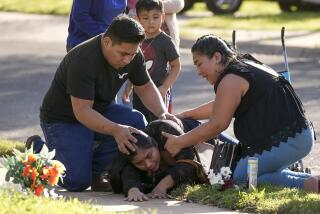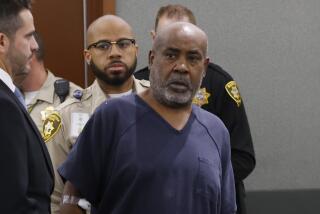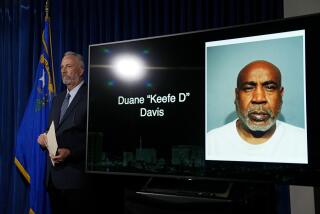Pakistan Probes Killing of Americans
- Share via
KARACHI, Pakistan — Police here said Wednesday that they had few leads and no suspects in the street slayings of four American oil workers but added that they were pursuing the possibility that the victims were executed to avenge the conviction of a Pakistani man in Virginia earlier this week for killing two CIA employees.
Karachi Police Chief Malik Iqbal said the June capture by FBI agents of Mir Aimal Kasi in northern Pakistan had inflamed anti-American feelings and that Kasi’s conviction may have done the same.
“It was an act of terrorism, but it is too early to say what the motive behind the murders was,” Iqbal said. “We think there is a strong possibility it was linked to the conviction of Kasi.”
Malik made the remarks hours after a group of assassins forced a car carrying the four Americans and a Pakistani driver off a busy street and shot them to death at close range--as dozens of panicked pedestrians watched. All five died at the scene.
The slayings followed a State Department warning to Americans abroad to watch out for attacks after Kasi’s conviction.
Kasi, 33, a Pakistani citizen, was convicted Monday of gunning down two CIA employees outside the agency’s gates in 1993. The jury is still deciding whether to sentence him to death, and the judge in the case ordered the jurors sequestered to shield them from news reports of Wednesday’s killings in Karachi.
In an emergency meeting of his Cabinet, Pakistani Prime Minister Nawaz Sharif ordered Interior Minister Chaudhry Shujaat to take control of the investigation.
At the White House, Press Secretary Mike McCurry called the killings “an outrageous act of barbarism” but said there was no known connection yet between the killings and Kasi’s conviction.
“I would stress at this point that we do not have direct evidence that links those two events,” McCurry said. “But obviously, we will watch for a link.”
McCurry said the killings would not affect plans for President Clinton and Secretary of State Madeleine Albright to visit Pakistan. Clinton’s trip is scheduled for early 1998; Albright is to arrive Sunday.
Officials at the U.S. Embassy in Islamabad, the Pakistani capital, spoke with evident frustration. “We don’t have anything,” embassy spokesman Barry Walkley said.
Clinton administration officials pointed out that Karachi, a sprawling city of 12 million--including 2,400 Americans--is among the most lawless corners of South Asia. The country has a long history of political kidnappings, murder and sectarian violence.
At the same time, U.S. officials said the initial description of Wednesday’s attack made it appear that assassins were gunning for Americans.
“If that’s true, it sends an ominous message,” a Clinton administration official said.
The slayings had an eerie precedent. In 1995, days after the Pakistani government extradited Ramzi Ahmed Yousef to the U.S. to be tried for his role in the 1993 World Trade Center bombing in New York, gunmen killed two employees of the U.S. Consulate in Karachi. Yousef was convicted Wednesday in the bombing.
The four Americans, all employees of Union Texas Petroleum, were identified by the company as senior auditor Ephraim Egbu, manager of audit projects Joel Enlow, audit manager Larry Jennings and senior audit supervisor Tracy Ritchie, all of Houston. The driver, Anwar Murza, was a Union Texas employee.
The four Americans had come to Karachi to audit the company’s operations. The bodies of the men, all in their 40s, were to be flown home to Houston today.
The shootings had all the marks of a planned attack. About 8:10 a.m. Wednesday, the four Texans climbed into the black Nissan station wagon that was waiting for them at the entrance of the Sheraton hotel and took off down N. T. Khan Street to their office a few miles down the road.
Minutes later, as they crossed an overpass, a red Honda Civic forced their Nissan to the curbside. Witnesses said a group of young men began firing with AK-47 automatic rifles into the Nissan while the victims were still inside. The gunmen then got out of their car to finish the job.
Witnesses said the five victims sat helpless in the car.
The slayings were witnessed by several school bus drivers who had been dropping off children at a school just over the bridge.
“The firing was so heavy, I thought they were shooting at us,” said Mohammed Akbar, a bus driver. “When the firing stopped, we saw the bodies in the car.”
Akbar said he saw a red Honda speeding from the scene.
Witnesses differed as to whether there were two, three or four gunmen.
Later in the day, Pakistani police recovered what they believed was the car used in the attack about two miles from the scene.
Washington contends that Kasni acted alone when he shot the CIA employees. But his dramatic capture by the FBI in Pakistan earlier this year prompted much anti-American anger and many demonstrations.
“Our government just stood aside and did nothing,” Karachi businessman Mohammad Ibrahim Kasumbi said. “People felt resentful.”
Union Texas has been active in Pakistan energy development for 20 years and has 600 employees here. The company produces about 30% of Pakistan’s oil output and about 10% of its natural gas.
Union Texas considered, but rejected, the idea of evacuating the 21 foreigners among its workers in Pakistan, said Arnold Hoffman, president of the company’s Pakistan operations.
Until Wednesday’s incident, Pakistan was not perceived as an unfriendly environment by the many foreign oil and gas companies that have arrived in recent years.
*
Times staff writers Robin Wright and Robert L. Jackson in Washington and Chris Kraul in San Diego, and special correspondent Zahid Hussain in Karachi, contributed to this report.
More to Read
Sign up for Essential California
The most important California stories and recommendations in your inbox every morning.
You may occasionally receive promotional content from the Los Angeles Times.










